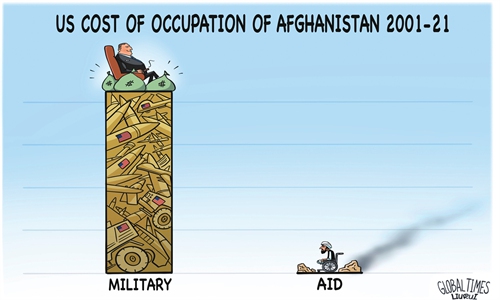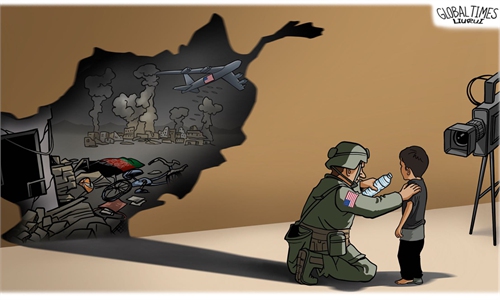September 11 attacks helped China’s rise? A serious misjudgment: Global Times editorial

A hijacked plane approaches the World Trade Center shortly before crashing into the landmark skyscraper on September 11, 2001 in New York City. Photo: AFP
Saturday marks the 20th anniversary of the 9/11 terror attacks. Many around the world are talking about this day, but deep reflection is rare within the US. Some US elites mentioned China, but they mostly emphasized that the US' war on terror launched after 9/11 presented an opportunity for China's rapid rise. Such rhetoric reflects their deep-rooted thinking: the US needs to be dedicated to containing China's rise and it has the capability to achieve that.It seems that the year 2001 was the first year of the post-9/11 era and this year is the 20th year in this era. Such political chronology is a result of serious American centrism and shows the US "mission" to contain China's rise. Talking about 9/11 in this way shows that US elites have not walked out of their illusion. They always believe the US should and is able to shape the world and that it just made a detour over the past 20 years.
The 9/11 attacks are indeed a major event. It had profoundly affected the US' foreign policy for a period of time. But viewing it as a certain turning point of the global situation is an exaggeration of its significance. It is also farfetched to link it with China's rise.
After 9/11, the US did have more interest in improving ties with China in order to focus its attention on the war on terror during this time, which was beneficial for China's overall international environment. But it must be made clear that China's rise should be attributed to multiple factors and its fundamental driving force came from within the country - China's socialist market economy unleashed the Chinese people's pursuit for better lives and China realized rapid development by meeting people's demand to the greatest extent.
China's deep integration into the global trading system was not a handout from the US and the West. It was the result of mutually beneficial cooperation between China and WTO members and the huge sacrifices of diligent and intelligent Chinese people, who also received benefits they deserve.
The New China initiated its modernization process and the reform and opening-up policies accelerated the country's industrialization. The first 20 years of the 21st century were meant to be the two decades for China to catch up with the world. Development and living a good life are the sacred rights of the Chinese people. There is supposed to be no barrier in the world to China's comprehensive progress. Containing China's development is an evil delusion. Imagining this as something that should have taken place but was missed because of 9/11 is a misjudgment of the times and laws of the world.
During the Obama era, the US tried the so-called Asia-Pacific rebalance strategy and attempted to isolate China through negotiations for the Trans-Pacific Partnerships. But former US President Donald Trump didn't think it was a good deal, so he abandoned it. Likewise, the US' current China containment strategy is not going smoothly. The failure of its trade war against China is as clear as its failure in its war in Afghanistan. The obstacles it has met in constructing an anti-China alliance are more than what it has gained on the surface.
Evidently, the US' approach toward the former Soviet Union during the Cold War does not work on China. Some US politicians are filled with hatred when they talk about China, but why couldn't they stop the scale of the China-US trade from hitting a record high after a temporary slip? Why couldn't they stop US allies from continuing to treat China as one of their most important economic partners?
Though it is a major event, 9/11 cannot change the logic of globalization and cannot affect China's national system and the Chinese people's dream and diligence. The end of the Afghan war may spare the US a little more resources against China, but this won't change the trend of the era, either. The trend is shaped by technological development and the political progress of mankind, and it will not be shifted at the will of a few US political elites.


